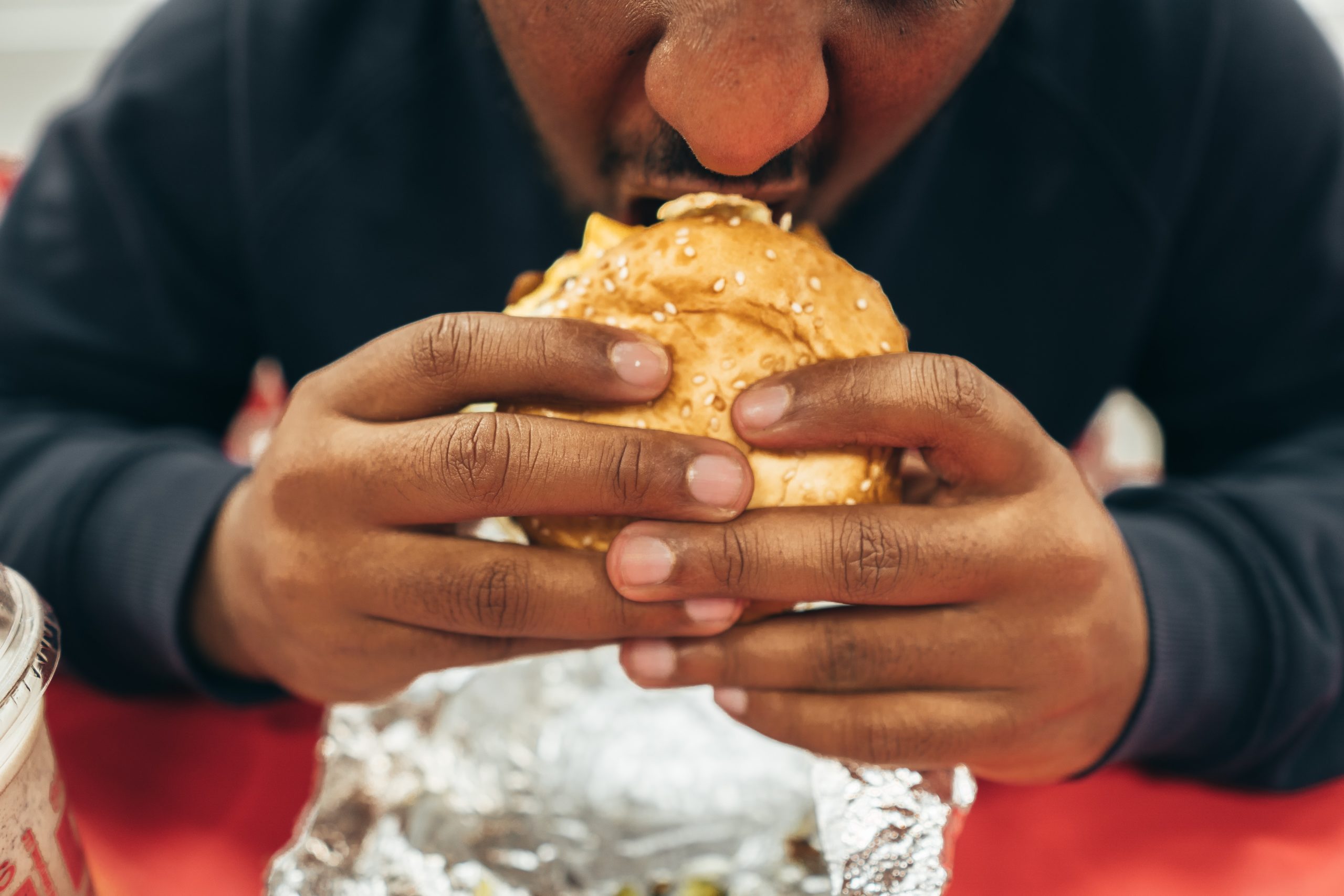The Anatomy of a Binge

Sharon L. Werner, MA, LLPC
“Bingeing is such an emotionally frenetic activity that no other concerns can exist in the same space. It is a hell that people who are food-sensitive are familiar with…”*
You’ve have had the worst day of your life…or so it feels. The day did not start well. You ate poorly the night before and did not sleep well. As a result, you overslept, rushed through your morning routine, and stepped on the cat’s tail, which caused you to topple your bowl of cereal, creating another slowdown as you were then forced to clean up the mess. Already late, you rushed to the car only to find that it wouldn’t start. When you finally managed to start the car and ease out of the driveway and out into traffic, you realized that every person in the five-county area had decided to populate the highway. After a desperate ten-minutes, you finally, desperately entered the stream of traffic. As you drove into work, your mind busily ruminated on the conversation that you imagined would ensue when you reached the office and you were, once again, late. The boss was not going to be happy!
The rest of the day continued in a similar vein, until finally, the long day is finally over, and you are desperate for something that will make you feel better. Something that will take away the frustration … and the self-judgments … and the overwhelm. You find yourself frantically searching through the contents of the refrigerator for something, anything that looks good. Something that will taste good. Something that will distract you from the abysmally horrible day you just had. Something that will soothe you, calm you, satisfy the frantic thoughts and the tension in your body.
Aha! You spot the grated cheese. Nachos sound good, you tell yourself. It was a rough day. After such a stressful day, who deserves a little treat more than you do? So, you carefully open a bag of tortilla chips and choose a handful – just a few! You stack them neatly on a tray and cover them with a carefully measured amount of cheese. While they heat in the microwave, you replay the day in your mind. The agitation grows. The fear. The shame. The humiliation. You tap your foot until finally the timer sounds, and you are soon blissfully engaged in the act of consuming nachos. But you don’t stop thinking about the day, not entirely…and now you realize that on top of everything else, you blew your diet. Arrgh! Oh, well! You might as well eat more. There is a whole bag of chips on the counter and more cheese in the refrigerator…and you can always start the diet again tomorrow.
Thirty minutes and three plates of nachos later, you come up for air. You are full – too full. You are groggy, sated, and somewhat comforted. But there is a new problem. Now the shame kicks in. And the self-judging voices follow close behind. “You blew it! You always blow it. Why can’t you control yourself? You’ll never get a grip. You’ll never lose weight. You’ll never succeed at anything.”
Sleep comes slowly that night. But you’re sure that as miserable as you feel tonight, you won’t eat this way again. You’ve learned your lesson.
Until the next worst day of your life.
 Binges come in many forms, and people binge for an abundance of reasons and in a variety of ways. Some people qualify for the diagnosis of Binge Eating Disorder (BED). Some do not meet the criteria of a clinical disorder, but nevertheless eat in response to strong emotions – or sometimes due to barely understood reasons. We might call it binge-eating, compulsive eating, stress eating, eating addictively, emotional eating, etc. Regardless of the label we use for the behavior, some of us gain weight due to eating excessive amounts during binge episodes. Others practice what are called “compensatory behaviors” (ways to offset the food eaten so that we do not gain weight) including purging, over exercising, etc.
Binges come in many forms, and people binge for an abundance of reasons and in a variety of ways. Some people qualify for the diagnosis of Binge Eating Disorder (BED). Some do not meet the criteria of a clinical disorder, but nevertheless eat in response to strong emotions – or sometimes due to barely understood reasons. We might call it binge-eating, compulsive eating, stress eating, eating addictively, emotional eating, etc. Regardless of the label we use for the behavior, some of us gain weight due to eating excessive amounts during binge episodes. Others practice what are called “compensatory behaviors” (ways to offset the food eaten so that we do not gain weight) including purging, over exercising, etc.
The common factor is often a desire to take care of ourselves in some way. We want to soothe the hurts. We want to express our anger. We want to do something, finally, to take care of ourselves after taking care of the needs of others all day. There is always a reason. And if we dig deeply enough, there is usually a good reason, even if we don’t like the method or the results. The problem is, of course, that in the case of emotional or compulsive eating, the solution always comes with repercussions. To paraphrase American Buddhist teacher and writer Pema Chodron, this approach leads to what we might call “happiness with a hangover.”
So, knowing this, how do we move forward?
Curiosity
The first step is to become curious about the process of bingeing or emotional eating. We might come to understand that this pattern – while it seems illogical and unproductive – does serves a purpose. We can spend time nonjudgmentally and compassionately exploring how the process works for us. Instead of judging ourselves, we get to know the nature of binges and the place they fill in our lives. With curiosity and kindness, we can put on our detective’s hat and explore the process. We might “process map” our patterns for a few weeks: First something happens…then we feel something in response (maybe fear, anger, or guilt)…then we tell ourselves a story about the situation and what the feelings mean (They hate me! I’m hopeless! This will never end.)…then we eat…then we have a feeling or sensation (perhaps guilt or regret, or notice that we are uncomfortably full)…then we tell ourselves a story, perhaps feeling regret, self-hatred, disgust…then we eat to take away the new feelings generated by the binge…and so the cycle spins.
Compassionate Exploration
With the wisdom gained from our nonjudgmental exploration of our eating patterns, we can begin to see ourselves, our lives, and our actions through the lens of compassionate wisdom. We can explore the purpose this process may be serving in our life. Are we eating to soothe or otherwise cope with our emotions? Do we need a way to “tune out”? Whatever the trigger or cause for us, it is possible to get to know the process of a binge: the tiny sensations in our bodies, the larger sensations, the thoughts, the emotions that precede a binge – and with this understanding, we can come up with a plan for change.
Change
Armed with the information we have gathered about how we “do” bingeing or emotional eating, we can begin to make changes in our attitude toward eating. There are many approaches available to support us in making changes in our relationship with food, including eating mindfully, intuitive eating, peer-support groups, compassion-focused approaches, emotion-regulation approaches, and more.
How to decide? Research. Read. Talk to others who struggle with food. Ultimately, the approach you choose should be one that honors your feelings, honors your struggles, and brings you into a closer, more supportive and compassionate relationship with yourself.
Some of the approaches listed above are self-help approaches. Other approaches include individual work with a therapist, group therapy, and guided self-help (individual therapy and group therapy).
Would you like to learn more about mindfulness- and compassion-oriented approaches to emotional eating? Unity Counseling offers individual and group counseling tailored to emotional/compulsive eating and binge eating from a mindfulness- and compassion-focused perspective. Please contact us for more information.
Below are additional resources you may find helpful in your compassionate journey.
Web sites:
https://www.grandrapidscenterformindfulness.com/
Grand Rapids Center for Mindfulness offers classes in Mindful and Intuitive Eating.
Books:
The Compassionate Mind Approach to Beating Overeating (Compassion Focused Therapy) – Kenneth Goss
Making a Change for Good – Cheri Huber
Eating with Fierce Kindness – Sasha Loring
The DBT Solution for Emotional Eating – Debra L. Safer, MD, Sarah Adler, PsyD, and Phillip Masson, PhD.
When Food is Love, Breaking Free from Compulsive eating, Appetites, and others – Geneen Roth
*from Feeding the Hungry Heart: The Experience of Compulsive Eating by Geneen Roth
